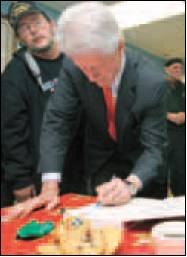Iraq War documentary rings in convenient truths
PBS's documentary series Frontline has been on the air for 25 years, but only now is it reaching millions of viewers. Its newest installment, "Bush's War," commemorates five years at war in Iraq in almost five hours, with piercing documentation of The Bush Administration's military efforts. Beginning with the decision to invade Afghanistan and concluding with the Iraq troop surge, the program misses very little. It anchors the viewer in the events and decisions in between, while steadfastly maintaining a keen, backwards-looking, historical perspective.
"Bush's War" is a news story wrapped in a history lesson disguised as a summer blockbuster. Combining interviews of top governmental officials with first-hand footage of explosive military firefights, Frontline takes the viewer behind closed doors and enemy lines at the same time.
Meanwhile, the secret story is juxtaposed with the media coverage absorbed by the public, inviting viewers to challenge misinformed viewpoints. Tune in to see the clash of egos behind the outwardly monolithic Bush administration, portrayed with the panache of a character drama: Rumsfeld vs. Tenet, Rumsfeld vs. Rice, and Rumsfeld vs. Alien vs. Predator (a.k.a. the Guantanamo story).
Of particular note is the documentary's constant reminder of what success in Afghanistan and Iraq must look like through the mouths of former intelligence, military, and White House officials. In Afghanistan, victory means the surrender of Taliban forces who took up guerilla opposition when their government was toppled, and who (with Al-Qaeda aid) still kill US and allied soldiers. In Iraq, success means teaching Iraqis forces to keep the peace so that democracy can take root (the opposite of a troop surge that uses American troops to do what we are not trusting Iraqi forces to accomplish).
Before ending abruptly, the series falls just short of concluding that the surge's touted "clear, hold, build" strategy has become as much of a fossil as the "light footprint" strategy - the theory that troop presence and visibility should be minimized - of a year ago. Perhaps this is an effort to maintain objectivity. But only so much objectivity is possible when the preponderance of documentary evidence points definitively in one unhappy direction.
So why is this documentary so suddenly popular? Some, including the series' producers, have speculated that with the Iraq War's five year anniversary and the upcoming presidential election, the timing was perfect. Fair enough, but if timing alone was sufficient, then Comedy Central's Lil' Bush would be a smash success. (It isn't.)
Convenience is one thing, but hard-hitting honesty is what really makes a documentary resonate. "Bush's War" rehashes what sheer embarrassment has made us prone to forget-and with painstaking and unabashed clarity. Remember when we thought that the war in Afghanistan was won? Can you recite the "sixteen words" of Bush's 2003 State of the Union that ended up being false? Does the name "Joseph C. Wilson IV" ring a bell?
Whatever you recall, whatever you think you remember from the past seven years, it turns out that the truth is always different from the Frontline.
Thursday, May 15, 2008
Iraq War documentary rings in convenient truths
Subscribe to:
Post Comments (Atom)

No comments:
Post a Comment